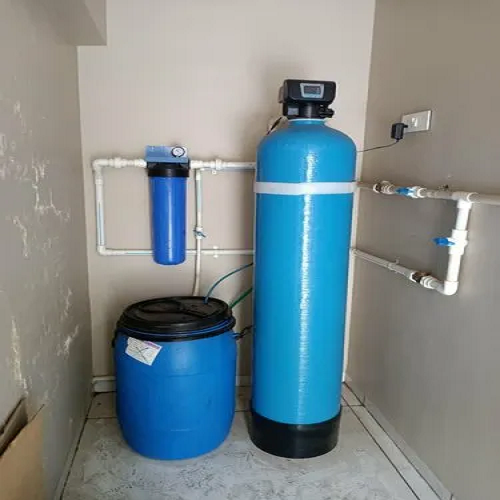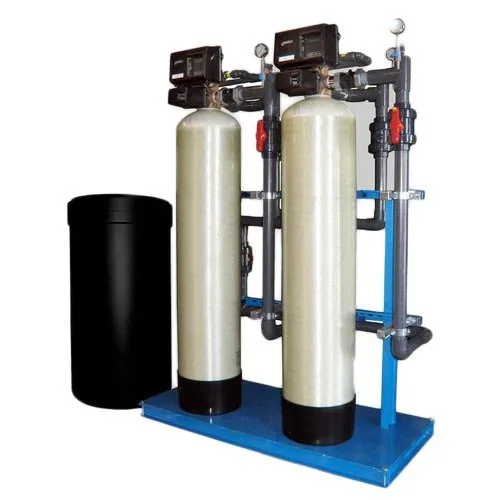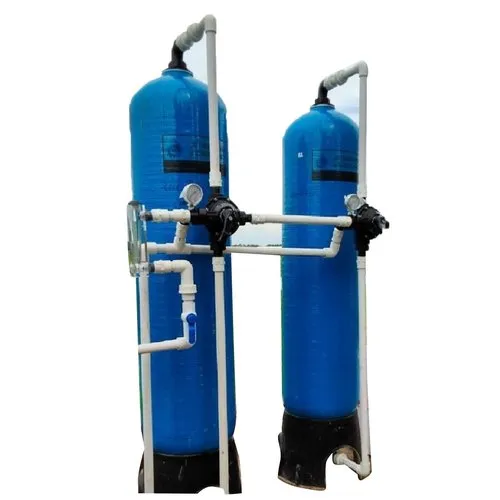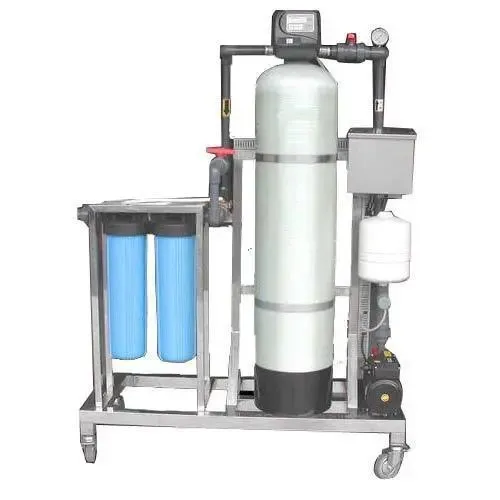
our category
SOFTNER PLANT
Softener Plant: Overview
A Water Softener Plant is a water treatment system designed to remove hardness-causing minerals, primarily calcium (Ca²âº) and magnesium (Mg²âº), from the water. Hard water, which contains these minerals in high concentrations, can cause problems such as scaling in pipes, boilers, and appliances, as well as reduced efficiency in detergents and soaps. A water softener plant uses a process called ion exchange to replace the calcium and magnesium ions with sodium or potassium ions, effectively softening the water.
Softener plants are widely used in residential, industrial, and commercial settings to ensure that water is soft and suitable for various applications such as washing, heating, and industrial processes. These plants are critical for industries where hard water could lead to equipment damage, inefficient operations, or poor product quality.
Enquire Now
How a Softener Plant Works
-
Ion Exchange Process: The core function of a water softener plant is based on the ion exchange process, where hard water is passed through a bed of resin beads. These beads are usually coated with sodium or potassium ions. As the hard water flows through the resin bed, the calcium and magnesium ions in the water are exchanged with sodium or potassium ions from the resin. This results in softened water, with reduced hardness levels.
-
Pre-Treatment: Before the softening process begins, water may undergo pre-treatment to remove larger particles, debris, and other impurities that could affect the softening process. This could include the use of sediment filters or activated carbon filters to eliminate suspended solids and chlorine, which can harm the resin beads.
-
Resin Regeneration: Over time, the resin beads in the softener plant become saturated with calcium and magnesium ions and lose their ability to soften the water. To restore their effectiveness, the resin beads undergo regeneration. This process involves flushing the beads with a brine solution (usually made from salt or potassium chloride) to remove the accumulated hardness ions and replace them with sodium or potassium ions. The regeneration process ensures the continuous operation of the softener.
-
Brine Solution Preparation: A brine solution is prepared by dissolving salt (sodium chloride) or potassium chloride in water. This solution is used during the regeneration cycle to "clean" the resin beads. After regeneration, the brine solution, along with the displaced hardness ions, is flushed out of the system.
-
Post-Treatment (Optional): Depending on the specific needs of the application, the softened water may go through additional post-treatment processes. For instance, filtration or UV sterilization could be used to further purify the water.
Types of Softener Plants
-
Residential Softener Plant: These systems are typically used in homes to provide softened water for everyday use, such as cooking, bathing, and cleaning. They usually have a smaller capacity compared to industrial or commercial systems and are designed to be easy to install and maintain.
-
Commercial Softener Plant: Commercial softener plants are used in establishments such as hotels, restaurants, and offices, where softened water is required for large-scale washing, laundry, and other activities. These systems are more powerful than residential softeners and can handle higher volumes of water.
-
Industrial Softener Plant: Industrial softener plants are used in large-scale operations where hard water could damage machinery, reduce efficiency, or impair the quality of products. These plants are found in industries such as textiles, food and beverage, pharmaceuticals, power plants, boiler feed water treatment, and cooling systems. Industrial softeners are designed to handle large flows of water and often incorporate advanced regeneration cycles for high efficiency.
Key Components of a Softener Plant
-
Resin Tank: The resin tank is where the ion exchange takes place. It contains the resin beads that remove calcium and magnesium ions from the water.
-
Brine Tank: The brine tank stores the salt or potassium chloride used for regenerating the resin beads. During the regeneration process, a brine solution is pumped into the resin tank to remove hardness ions and restore the resin's ability to soften the water.
-
Control Valve: The control valve is responsible for managing the flow of water through the softener plant, regulating the regeneration process, and ensuring that water is distributed appropriately to various parts of the system.
-
Pre-Filters: Pre-filters, such as sediment filters or activated carbon filters, are used to remove dirt, debris, and chlorine from the water before it enters the softening unit. This helps extend the life of the resin and improve the overall efficiency of the system.
-
Post-Softening Filter: In some softener systems, a post-softening filter may be used to further polish the softened water, removing any remaining impurities.
Benefits of Using a Softener Plant
-
Prevents Scale Build-Up: Softened water helps prevent scale formation in pipes, boilers, and appliances, reducing maintenance costs and increasing the lifespan of equipment. This is especially important in industries such as power generation, manufacturing, and hospitality, where scale build-up can lead to efficiency losses.
-
Improved Efficiency: Softened water helps detergents and soaps to work more effectively, reducing the amount needed for cleaning, washing, and bathing. This results in lower costs for soaps and cleaning agents in both residential and commercial settings.
-
Cost Savings: By preventing scale accumulation, a softener plant can help reduce the need for costly repairs or replacements of plumbing systems, heating elements, and industrial equipment. It can also reduce energy consumption, as scale in boilers and heat exchangers can reduce heat transfer efficiency.
-
Enhanced Water Quality: Softened water is often preferred for drinking, cooking, and bathing due to its smooth texture and the absence of hardness-causing minerals. It can improve the taste of beverages and food prepared with water and prevent soap scum formation on dishes and utensils.
-
Eco-Friendly: Softener plants help reduce the need for bottled water, encouraging the use of reusable containers. Additionally, by reducing the amount of soap and detergent required, softeners contribute to less chemical discharge into the environment.
-
Longer Lifespan for Appliances: Water softening helps increase the lifespan of household appliances such as washing machines, dishwashers, and water heaters, which would otherwise be prone to scaling due to hard water.
-
Protects Industrial Equipment: For industries relying on water for boilers, cooling towers, and other machinery, softened water prevents scaling and corrosion, ensuring efficient and continuous operation.
Challenges of a Softener Plant
-
Salt and Chemical Use: The process of regenerating resin beads requires the use of salt or potassium chloride, which can be a concern for areas with high salinity or environmental regulations. Proper disposal of brine (wastewater) generated during regeneration is also important to avoid environmental contamination.
-
Periodic Maintenance: Softener plants require periodic maintenance to ensure their efficiency, such as replacing the resin, cleaning the brine tank, and replenishing the salt supply. This could add to operational costs and time.
-
Water Wastage: The regeneration process can lead to water wastage, especially when large volumes of brine are flushed out during cleaning cycles. However, newer systems are designed to minimize water usage during regeneration.
-
Not Suitable for All Water Types: Softener plants are best suited for treating hard water. However, they may not be effective for removing other water contaminants such as bacteria, viruses, or heavy metals. For such cases, additional water treatment methods like reverse osmosis (RO) or UV purification may be necessary.
Applications of a Softener Plant
-
Residential Use: Softener plants are commonly used in homes where water hardness is a problem. They are installed to ensure clean, soft water for everyday use, such as washing clothes, bathing, and cooking.
-
Commercial Use: In commercial settings like hotels, laundromats, restaurants, and offices, softener plants ensure that water is suitable for cleaning, laundry, and other activities. Softened water helps improve the efficiency of soap and detergents used in large quantities.
-
Industrial Applications: Industries such as textile manufacturing, food and beverage production, boiler operations, pharmaceutical production, and power plants all rely on softened water to avoid scaling, corrosion, and equipment damage. Softener plants are crucial in ensuring the longevity and efficiency of industrial systems.
-
Agriculture: Softener plants can be used in irrigation systems to prevent the clogging of pipes and sprinklers caused by hard water scaling.
Conclusion
A Softener Plant is an essential water treatment system designed to remove hardness-causing minerals, providing numerous benefits in both residential and commercial settings. By using the ion exchange process, these plants prevent scale formation, improve the effectiveness of detergents, reduce maintenance costs, and protect equipment from damage. While challenges such as salt use, water wastage, and periodic maintenance exist, the advantages of softened water make it an invaluable solution for many industries and households.



.jpg)
